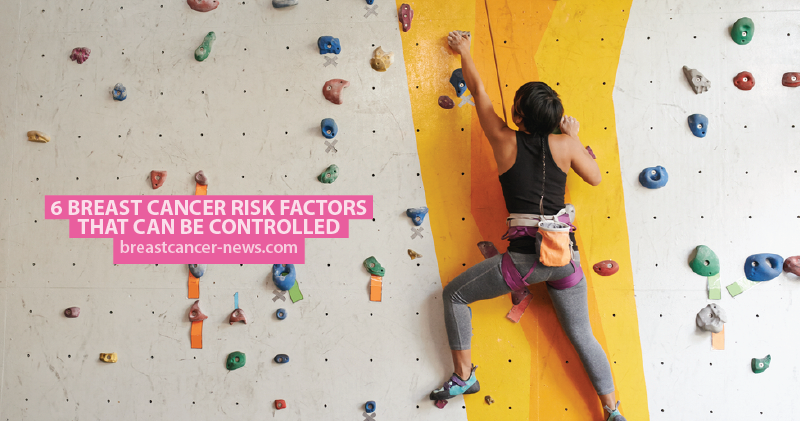There are many breast cancer risks that are out of our control such as family history, pollution, genetics, and radiation treatment but equally, there are things you can avoid that will help decrease your chance of developing the disease. We’ve put together a list of breast cancer risk factors that can be controlled using information from breastcancer.org.
1. Weight
Being overweight or obese increases a person’s risk of developing the disease, and luckily it’s among the factors that can be controlled. Defined as having a body mass index (BMI) lower than 24.9, maintaining a healthy weight is particularly important after menopause. When women menstruate, the female sex hormone estrogen is produced in the ovaries but after menopause, it is mainly produced by fatty tissue. Having more fat cells means a higher production of estrogen, which can result in the development and growth of hormone-receptor-positive breast cancers. For women who have recovered from breast cancer, being overweight leads to a higher risk of cancer recurrence.
2. Diet
A healthy diet is good for overall health but it can also play a role in the development of breast cancer. Although eating certain foods won’t prevent breast cancer, eating unhealthy food is thought to contribute to the onset of about 30 to 40 percent of all cancers. Research has found that nutrients from foods such as vegetables, fruits, whole grains, and legumes can increase energy and overall health, which helps to prevent certain diseases including breast cancer. In addition, organic food can protect women from the cell mutations which can lead to breast cancer.
3. Exercise
Exercising regularly may also decrease the risk of breast cancer. Moderate exercise (30 to 60 minutes of walking each day) can lower the risk of the disease. In addition, those who exercise are more likely to eat better and maintain a healthy body weight.
Exercise helps to control blood sugar and lower insulin levels which can affect breast cells.
Read our nine tips to help motivate yourself to exercise.
4. Alcohol Consumption
Women who consume alcohol regularly—classified as three alcoholic drinks every week, have a 15 percent higher chance of suffering from breast cancer than women who don’t drink at all. This correlation is explained by the fact that drinking alcohol increases the levels of estrogen and other hormones in the body, which are related to hormone-receptor-positive breast cancer. Alcohol has also been shown to increase the risk by damaging DNA in the cells. In addition, the risk is higher as the consumption increases, on an estimated scale of 10 percent for each additional drink consumed regularly.
5. Smoking
Smoking is linked to many serious diseases including breast cancer, particularly among younger and premenopausal women. There is evidence to suggest that excessive secondhand smoke may increase the risk of breast cancer in women who are postmenopausal.
6. Hormone Replacement Therapy
Hormone replacement therapy (HRT) is often recommended by doctors to relieve the symptoms of menopause and address long-term biological alterations such as bone loss. However, it is now known that it can impact breast cancer risk. The therapy mimics exposure to hormones and the combination of estrogen and progesterone or taking estrogen alone for many years can be harmful.
Discover 11 things about breast cancer women with the disease want you to know.
Breast Cancer News is strictly a news and information website about the disease. It does not provide medical advice, diagnosis or treatment. This content is not intended to be a substitute for professional medical advice, diagnosis, or treatment. Always seek the advice of your physician or other qualified health provider with any questions you may have regarding a medical condition. Never disregard professional medical advice or delay in seeking it because of something you have read on this website.

